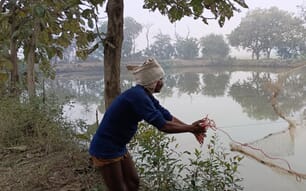Catfish, crappie, bass and other fish popular among anglers at the lake don't appear to have been affected, and humans are not affected either, say California Department of Fish and Game experts.
"It appears as if koi herpes virus killed the carp in the lake, as many as 90 percent or more" of them, said Brian Beal, fish biologist with the state agency told Visalia Times Delta. He estimated that equals about 5,000 to 7,000 dead carp.
Fish and Game was called in by the Army Corps of Engineers, which manages Lake Kaweah, after rangers there received reports of large numbers of dead fish washing up on the shores, starting in early June.
The overwhelming number of them were carp, said Mr Beal, who during his own inspection along a theee-mile stretch of shoreline in mid-June found 147 dead carp and only five other dead fish. While it is common to find a few dead fish along shorelines, the numbers he found, along with the numbers rangers and visitors reported finding, indicated that something was wrong with the carp in the lake.
Mr Beal sent a few of the carcasses he found to a state fish pathology lab, but they had been in the sun too long and were too decomposed for a pathologist to find definitive proof of what killed them. A pathologist later went to the lake to catch fish using a device placed in the water that electrically stuns fish, but among the 200 fish caught and released that day not a single carp was found, Mr Beal said.
Still, based on the manner and speed by which so many fish died, he said the pathologists are confident the Lake Kaweah carp died from koi herpes, a strain of herpes known to affect only common carp, the type found in the lake, and koi, specially bred carp often used to stock ornamental ponds.
"Basically, [nearly] all the carp in the lake died rather suddenly over a three-week period," which is consistent with how quickly koi herpes spreads and kills.
In fact, the disease can be 100 per cent fatal among exposed carp and koi, said Dr E. Scott Weber, who leads the Aquatic Animal Health programme at the University of California, Davis, School of Veterinary Medicine.
He said the first case in the United States was discovered in 1998 among fish in a Wisconsin koi pond. Dr Weber said it is likely the disease was carried by koi imported from Israel or Japan, and outbreaks have since been reported in numerous ponds across the United States.
In February, an outbreak of koi herpes (also called koi herpesvirus and cyprinid herpesvirus 3) killed all 300 koi in a Japanese -garden pond at California State University, Long Beach, according to the university's student newspaper.
Outbreaks also have occurred in larger waterways, including Lake Mojave, the Colorado River, and Clear Lake in California, Mr Beal said. "It's becoming more common in California."
Unlike some diseases, the spread of koi herpes does not follow a particular pattern, reports Visalia Times Delta. Outbreaks occur in various parts of the country, which leads some researchers to believe it could be spread by contaminated mud or water on boats or birds or animals or fishing gear.
On the other hand, it is possible that lakes or streams could be infected by koi pond owners who are getting rid of their sick fish by dumping them in lakes and streams, Dr Weber said. It is believed the virus is carried by mucus and skin cells of infected fish, and it gets into the water and other fish simply swim into it. There is no known treatment for the virus, and Beal said that even if Fish and Game officials had been aware of the suspected Lake Kaweah outbreak before so many fish died, there was nothing they could have done to prevent it.
He added that there do not appear to be any outbreaks among carp at Lake Success or other Central Valley lakes and streams.
When asked about the potential of the virus to affect other fish and humans, Dr Weber said it is highly unlikely that anything other than a carp could be infected but "The unfortunate thing about fish disease is we don't have as much information on them as in other animals."
Still, he and Mr Beal said people should not be worried about eating carp or any other fish found in the lake. As for the other effects of losing so many carp at Lake Kaweah, Phil Deffenbaugh, park manager, said most people who fish the lake are not interested in carp to eat though they do seem popular among fishermen of Asian descent.
Dr Weber said carp eat insect larva, frog eggs and tadpoles, so the loss could affect their populations in the future. In the meantime, Mr Deffenbaugh said he still sees carp in the lake, though less frequently.
Mr Beal told Visalia Times Delta that he estimates it may take five to seven years for them to rebound and repopulate to the same numbers they had achieved before the outbreak.
Koi Herpes Virus Suspected in California Carp Deaths
CALIFORNIA, US - Nearly the entire population of carp at Lake Kaweah may have been wiped out by an outbreak of a herpes virus, state wildlife officials say.


